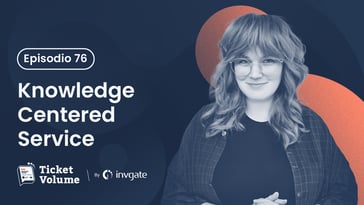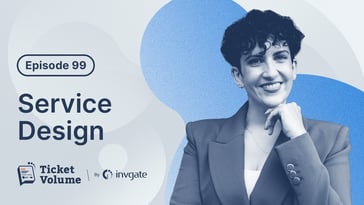Traditional IT Service Management (ITSM) training methods have long been associated with uninspiring, dry experiences. It's time to introduce a game-changer – ITSM simulations. This innovative approach is poised to completely transform the training landscape by reinventing how we grasp and implement ITSM principles.
Simulations represent a paradigm shift in training, providing a hands-on, immersive learning experience that allows participants to apply ITSM principles in real-world scenarios. The result? A profound enhancement of ITSM knowledge, skills, and capabilities.
In the 67th episode of Ticket Volume, our host and InvGate Product Specialist, Matt Beran, sits down with James Gander, Managing Director of Gander Service Management. Together, they navigate the transformative landscape of ITSM simulation and shed light on its potential.
Keep scrolling to explore a concise written summary of this episode – but remember that you can take your engagement a step further. Register for our monthly live recordings, where you can participate in real-time discussions.

A global perspective on ITSM
James opens the conversation by emphasizing a key aspect of IT Service Management: its intrinsic connection to people. While systems, processes, and services are at the core, they all revolve around the goal of providing value to individuals. Whether it's customers seeking satisfaction or the service providers themselves aiming for excellence, it ultimately boils down to people.
|
|
"We provide services to add value. We add value so that people can get what they want out of a service. But, we also make sure that the people delivering the services can do it well." James Gander |
Are there regional differences in Service Management? James acknowledges that while IT Service Management principles remain consistent, the level of adoption and maturity can vary from region to region. In his observations, New Zealand had a higher percentage of organizations new to ITSM compared to more established Service Management landscapes in the UK and Australia.
"Does that mean we are different from anywhere else in the world? I don't know. My gut feeling is possibly, but maybe not," James remarks. He also notes that some organizations in New Zealand are ahead of the curve due to their agile approach and willingness to embrace new methods.
The power of ITSM simulation in learning
The conversation takes an interesting turn as James shares his passion for simulations as a training tool. He discusses his experience with simulations like the Phoenix Project and MarsLander and how they provide valuable insights into various aspects of Service Management.
James highlights how these simulations can replicate real-world scenarios and engage participants in problem-solving, collaboration, and learning.
1. The Phoenix Project simulation
As described by James Gander, the Phoenix Project simulation serves as a remarkable bridge between the wider organization and the IT department, allowing participants to immerse themselves in the intricate world of ITSM. This experiential learning tool offers a hands-on experience that faithfully replicates real-world IT operations' multifaceted challenges and complexities.
What truly sets this simulation apart is its adaptability to the individual learning needs of each participant. James underscores that every person extracts different insights at various stages throughout the day-long exercise. It's a dynamic and transformative journey where theoretical ITSM principles are tightly woven into the fabric of practical application.
As the simulation unfolds, participants witness a gradual metamorphosis in their comprehension of ITSM concepts. They start connecting the dots between the theories they've encountered and the tangible practices they are engaging with.
In essence, The Phoenix Project simulation transcends traditional training by encouraging engagement, fostering collaboration, and igniting the spark of innovation. This aligns with the insights of Lorn Campbell in episode 28, who emphasizes the transformative power of simulations in promoting organizational innovation.
2. The MarsLander simulation
The MarsLander simulation, also discussed by James Gander, is a unique training experience designed to address Agile Service Management concepts. It complements foundational training in ITIL or other frameworks, providing participants with a keen awareness of Service Management's core principles.
Unlike the Phoenix Project, which delves into communication between the wider organization and the IT department, MarsLander focuses on the intricacies of internal communication within IT teams. Nevertheless, it emphasizes the importance of maintaining a dialogue with customers.
During this simulation, participants delve into the intricacies of handling incidents and issues, understanding how events unfold, and learning to manage them effectively. It offers valuable lessons on negotiating service levels, balancing project work with business-as-usual (BAU) activities, and identifying opportunities for service improvements.
Perhaps the most striking aspect is how MarsLander enlightens participants about the significance of service improvements, often overlooked in favor of new projects. This simulation encourages teams to embrace collaboration, adopt visualization techniques, and instill practices that intuitively resonate as "good." It's an eye-opening experience where every individual and team gleans distinct insights during each encounter.
James Gander's enthusiasm for both the Phoenix Project and MarsLander simulations is palpable. He wishes he had embraced these powerful learning tools earlier in his career, as they condense months of reading and studying into a single day of immersive learning.
The transformative nature of ITSM simulations is recognized by Paul Wilkinson and discussed in episode 30. Wilkinson emphasizes that organizations that overlook the importance of service improvement are more likely to fail in their digital transformation efforts.
Online ITSM simulation for remote teams
In the era of remote work, James mentions that simulations can be adapted for online delivery, allowing teams spread across the globe to benefit from this experiential learning. While in-person interactions are preferred, the online versions still deliver essential learning outcomes.
Principles vs. frameworks: Do we need both?
In a thought-provoking moment during the conversation, James reflects on the interplay between principles and frameworks within ITSM. He encourages reflection on whether frameworks are necessary when there is a solid foundation of guiding principles.
James notes that many of these principles span different ITSM frameworks, implying a degree of universality in their application. With just a few adjustments, these principles can be adapted and adopted universally, regardless of the specific framework used.
James highlights several of these essential principles that underpin effective ITSM practices, which include:
- Identify and deliver value or have satisfied customers.
- Keep improving.
- Aim for perfection.
- Get a culture to welcome change, collaboration, and sharing of knowledge.
- Have an end-to-end view.
- Keep it simple.
|
|
"If you've got these six principles behind you, do you actually need frameworks or ways of working? You can just sit down and go, well, what are we gonna do? Well, these are the things we want to be aiming at" James Gander |
This perspective challenges the conventional notion that frameworks are the only way to achieve organizational excellence and suggests that principles can serve as a solid foundation.
Conclusion
In this article, we've scratched the surface of the enlightening conversation between James Gander and Matt Beran on the power of ITSM simulation. While we've captured key takeaways, the full episode holds a treasure trove of additional insights and anecdotes.
To delve deeper, tune in to the complete discussion. The complete episode is available on Apple Podcasts, Spotify, YouTube, or your favorite podcast platform.
And if you're hungry for more knowledge and want to be part of our community, don't forget to subscribe to stay updated on our monthly live sessions. There's always more to explore in the ever-evolving landscape of IT Service Management!















